Protecting your beloved canine companion from fleas, ticks, and other parasites is a crucial part of responsible pet ownership. These tiny invaders can cause discomfort, skin irritations, and transmit serious diseases like Lyme disease, ehrlichiosis, and even heartworm. While veterinarian-prescribed medications offer comprehensive protection, many effective over-the-counter (OTC) options are available for diligent dog owners. This guide will help you navigate the choices and find the best flea and worm treatment for dogs that fits your needs and your dog’s lifestyle.
Understanding Flea, Tick, and Worm Prevention for Your Canine Companion
Fleas are a common nuisance, causing intense itching and potentially leading to allergic reactions or secondary skin infections. Ticks, found in grassy and wooded areas, are notorious for transmitting diseases. Beyond external parasites, internal parasites like hookworms and roundworms can cause digestive issues, nutrient deficiencies, and in severe cases, be life-threatening. Heartworm, spread by mosquitoes, is particularly dangerous, affecting the heart and lungs and requiring complex treatment. Effective prevention is key to avoiding these health concerns, making it essential to find a solution that offers robust protection against the specific threats your dog faces. For a truly comprehensive approach, considering a best worm flea and tick treatment for dogs might be necessary, often involving both internal and external parasite control.
Top Over-the-Counter Flea and Tick Solutions for Dogs
When exploring over-the-counter options, it’s important to understand their strengths and limitations. These readily available treatments can be highly effective for specific types of parasites or for repelling pests before they can bite.
Seresto Flea and Tick Collar for Dogs: Long-Lasting External Protection
The Seresto Flea and Tick Collar for Dogs stands out for its impressive eight-month duration, offering one of the longest-lasting protections among flea and tick treatments. This collar is designed to kill and repel fleas and ticks, meaning these pests don’t need to bite your dog to ingest the treatment. This repellent action can significantly reduce the risk of tick-borne infections like ehrlichiosis and Rocky Mountain spotted fever, which can be transmitted within hours of a tick attachment. Veterinarians often recommend using an isoxazoline as a baseline, and then adding a repellent collar like Seresto for enhanced protection in tick-heavy areas. While highly effective against external parasites including fleas, black-legged ticks, brown dog ticks, American dog ticks, lone star ticks, chewing lice, and sarcoptic mange, it does not provide protection against internal parasites such as heartworm, hookworm, or roundworm. It’s available in two sizes for small dogs (up to 18 pounds) and large dogs (over 18 pounds).
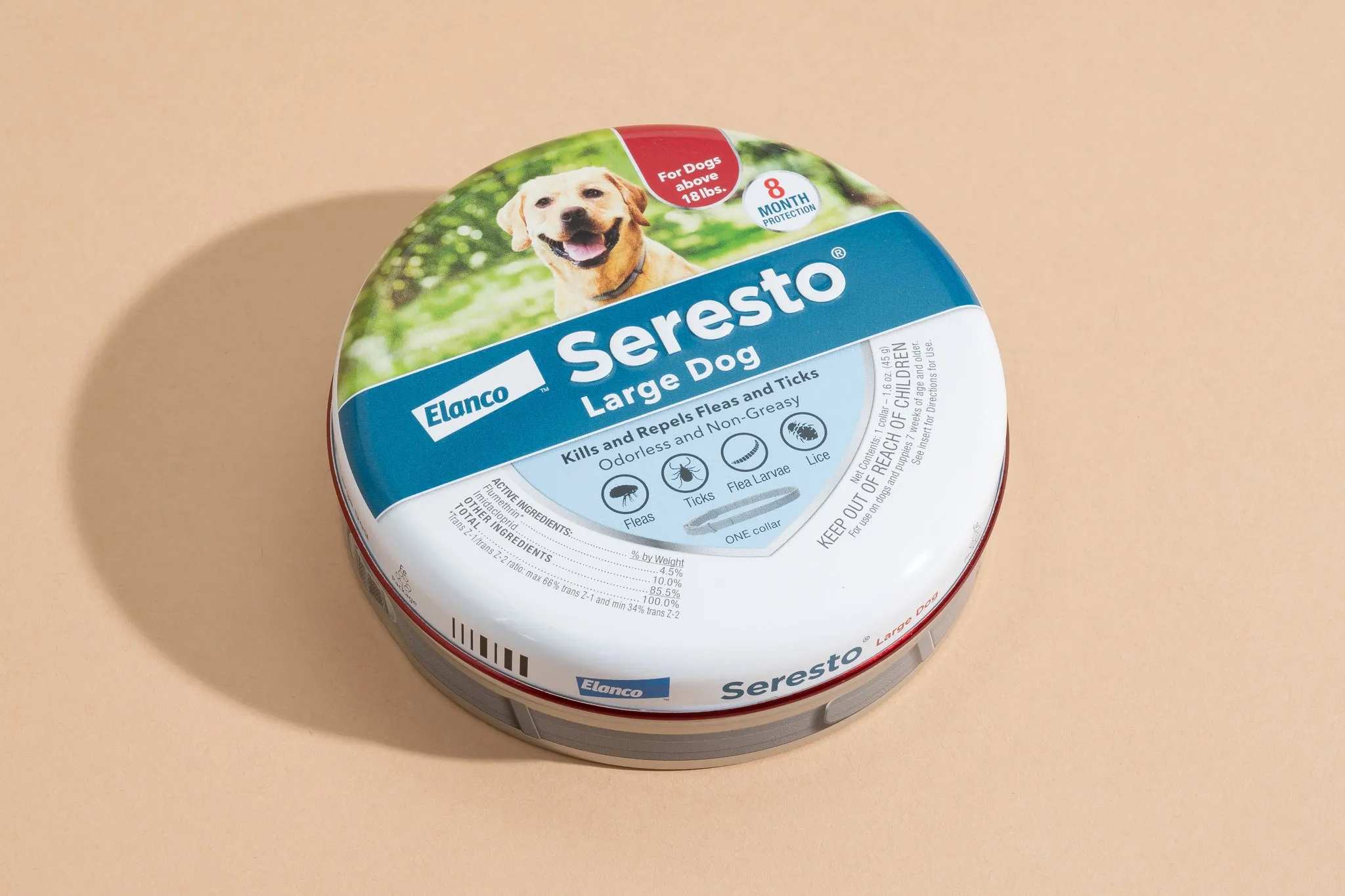 A tin containing a Seresto Flea and Tick Collar for Dogs.
A tin containing a Seresto Flea and Tick Collar for Dogs.
This convenient collar is a great option for owners seeking a low-maintenance, long-term solution for external parasite control. However, if internal parasites are a concern, a separate treatment will be necessary. In recent years, there have been some safety issues concerning the collar’s release mechanism, which is important to be aware of when considering this product.
K9 Advantix II Flea and Tick Spot Treatment for Dogs: Repelling a Wider Range of Pests
K9 Advantix II Flea and Tick Spot Treatment for Dogs offers a robust monthly topical solution that is available over the counter. This treatment not only kills and repels fleas, ticks, and lice but also effectively repels biting flies and mosquitoes, which are carriers of serious diseases like heartworm and West Nile virus. Unlike oral treatments that enter the bloodstream, Advantix II works on the surface of your dog’s skin and hair coat, stopping pests before they bite. This is similar to how many frontline flea and worm treatment for dogs products operate.
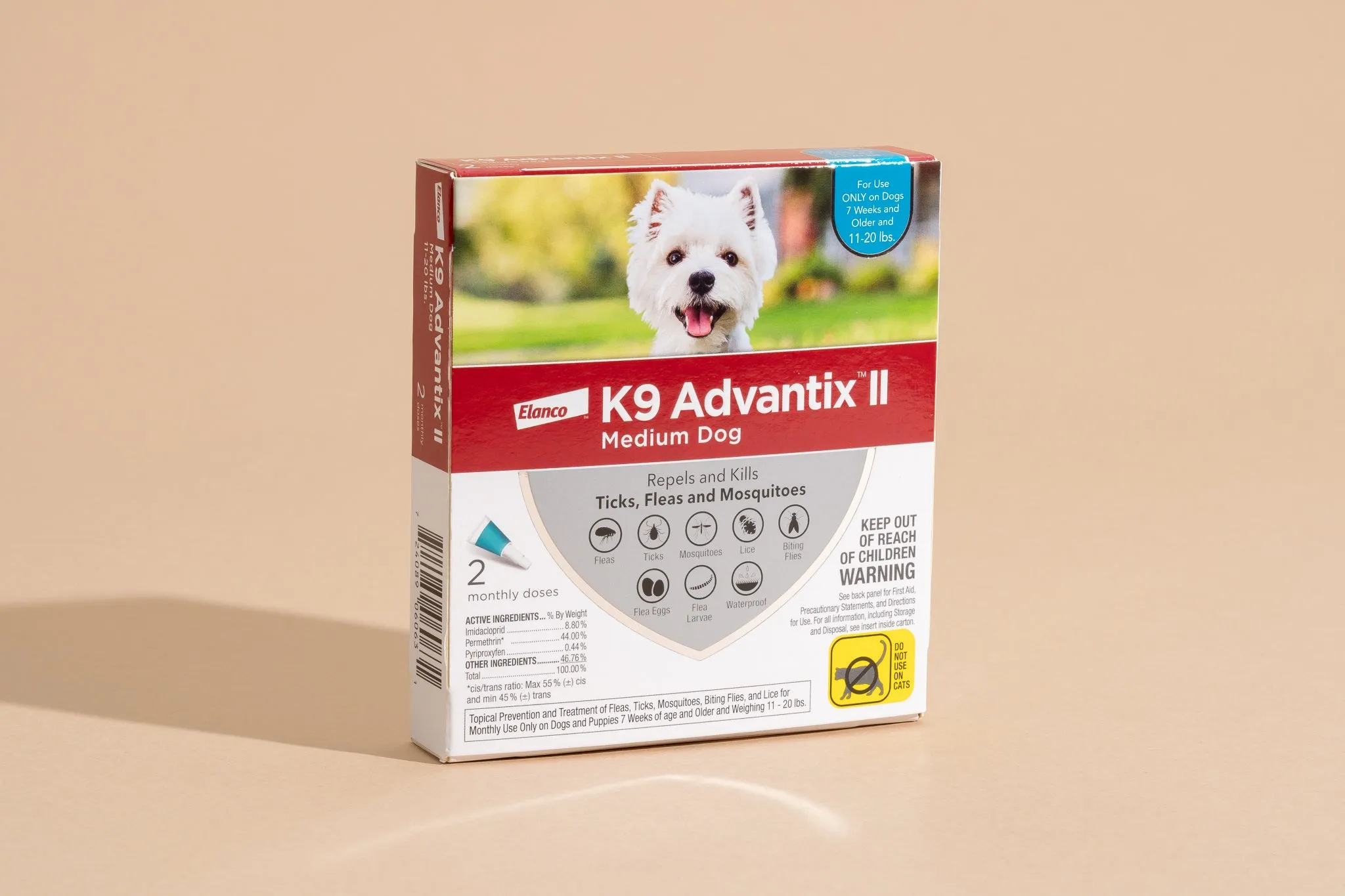 A box of K9 Advantix II Flea and Tick Spot Treatment for Dogs.
A box of K9 Advantix II Flea and Tick Spot Treatment for Dogs.
Its active ingredients, imidacloprid and permethrin, have a long history of use in pest control. However, a critical consideration for this product is permethrin’s toxicity to cats. If you have both dogs and cats in your household, it is essential to keep treated dogs separated from cats for at least 24 hours after application to prevent accidental ingestion by your feline friends. Additionally, the label warns that Advantix II is “extremely toxic to aquatic organisms,” requiring careful disposal. K9 Advantix II is available in four dosages to suit dogs ranging from 4 pounds to over 55 pounds, providing a versatile OTC option for external parasite and mosquito control.
When to Consider Prescription-Strength Protection
While over-the-counter options offer excellent protection against many parasites, certain situations, particularly those involving a broader spectrum of internal and external parasites, may warrant a conversation with your veterinarian about prescription-strength treatments. These medications often contain active ingredients that target a wider range of pests, including heartworm and multiple types of intestinal worms, alongside fleas and ticks. If internal parasites like hookworm are a significant concern for your dog and you’re exploring options, understanding both OTC limitations and prescription benefits is crucial. For specific internal parasite treatments, you might also look into over the counter hookworm medicine for dogs if your vet determines it’s appropriate for your dog’s needs.
Simparica Trio Chewable Tablets for Dogs: Comprehensive All-in-One
Simparica Trio is a monthly, prescription-only chewable tablet that provides an expansive range of protection. It effectively treats and controls fleas, hookworm, roundworm, and five types of ticks, including the Gulf Coast tick, which is expanding its geographical range. Crucially, it also prevents heartworm disease, a severe and potentially fatal condition. The tablet combines three active ingredients: sarolaner (an isoxazoline) to kill fleas and ticks, moxidectin for heartworm prevention, and pyrantel to target hookworms and roundworms. This all-in-one approach offers broad protection from a single, liver-flavored chew, making administration convenient for many dog owners.
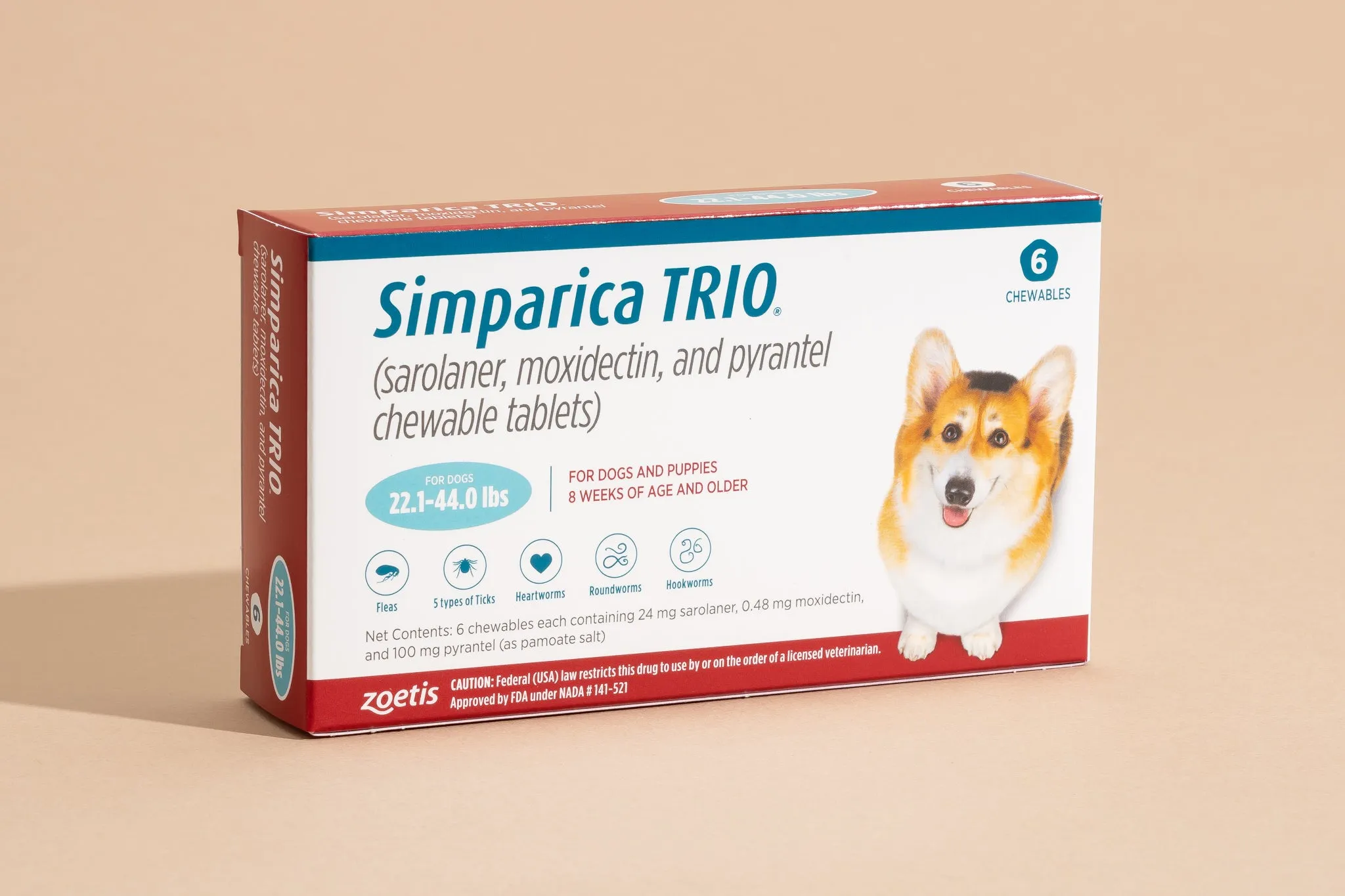 A box of Simparica Trio Chewable Tablet for Dogs.
A box of Simparica Trio Chewable Tablet for Dogs.
It can be used in puppies eight weeks and older weighing at least 2.8 pounds and is available in dosages for dogs up to 132 pounds. While not an OTC option, its comprehensive coverage makes it a top choice for many veterinarians and pet owners seeking maximum protection.
Bravecto Chew for Dogs: Extended Flea and Tick Defense
Another powerful prescription option is Bravecto Chew for Dogs, renowned for its long-lasting efficacy against fleas and ticks. A single chew provides up to 12 weeks of protection, significantly reducing the frequency of administration compared to monthly treatments. Bravecto’s active ingredient, fluralaner (also an isoxazoline), is highly effective at killing fleas and various ticks, including the Asian longhorned tick, which is not covered by some other treatments.
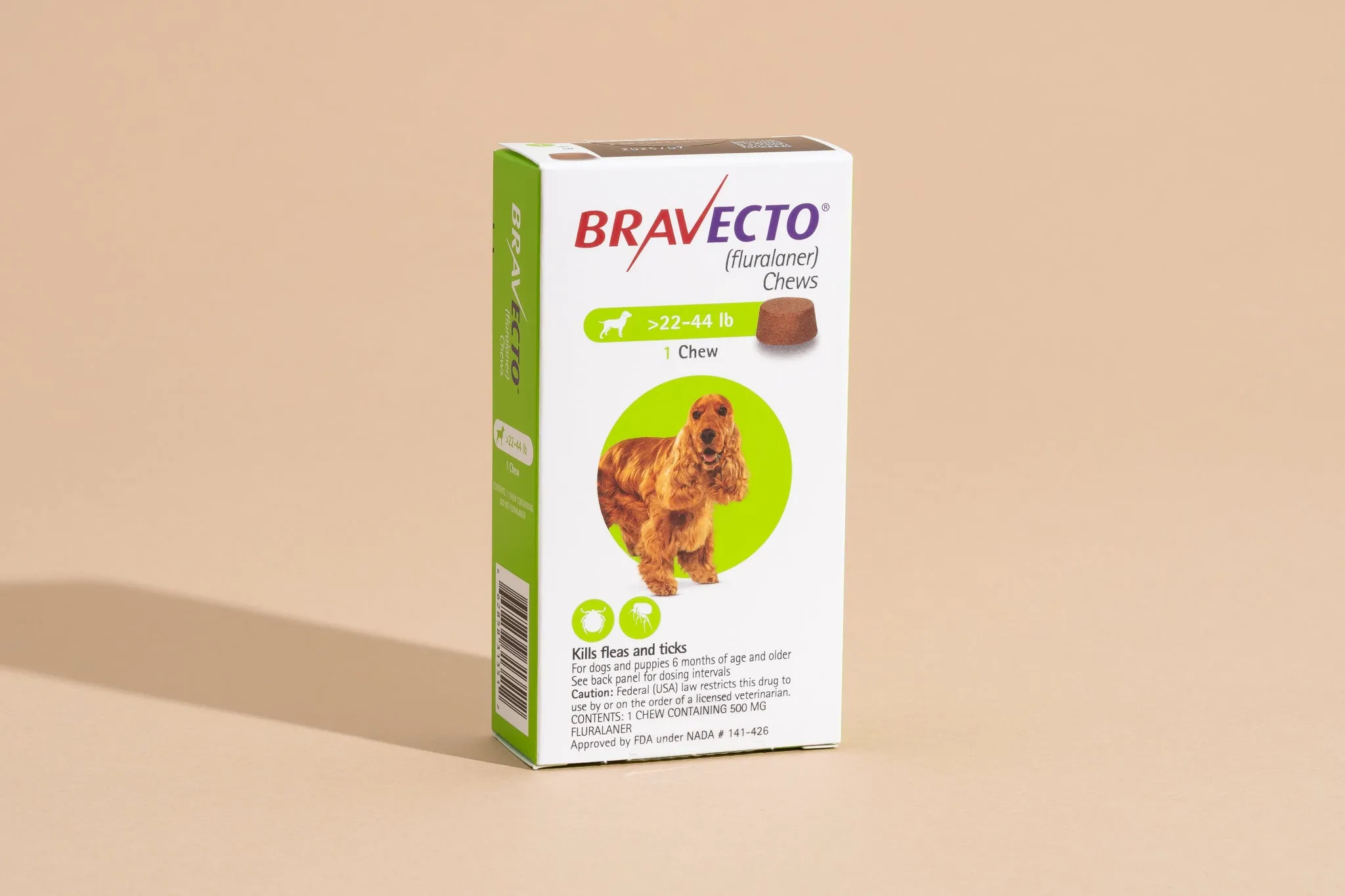 A box of Bravecto Chew for Dogs.
A box of Bravecto Chew for Dogs.
It’s important to note that while Bravecto is excellent for external parasites, it does not prevent heartworm or treat hookworm and roundworm, meaning a separate product would be needed for internal parasite control. For dogs in areas with high lone star tick populations, the recommendation is to administer Bravecto every eight weeks for full coverage. Bravecto is available in multiple dosages for dogs weighing from 4.4 to 123 pounds, and a topical form is also available for dogs with specific dietary needs or those who dislike chews.
Choosing the Right Flea and Tick Treatment for Your Dog
Selecting the optimal flea and tick treatment for your dog involves considering several factors. Your dog’s lifestyle, including how much time they spend outdoors and their exposure to different environments, plays a significant role. The prevalence of specific parasites in your geographic area should also influence your choice. For instance, if heartworm is a major concern, you’ll need a product that specifically prevents it. Your dog’s age, weight, and any existing health conditions are also crucial. For dogs with specific health needs, such as best dog food for heartworm positive dogs, choosing the right preventative care is even more critical.
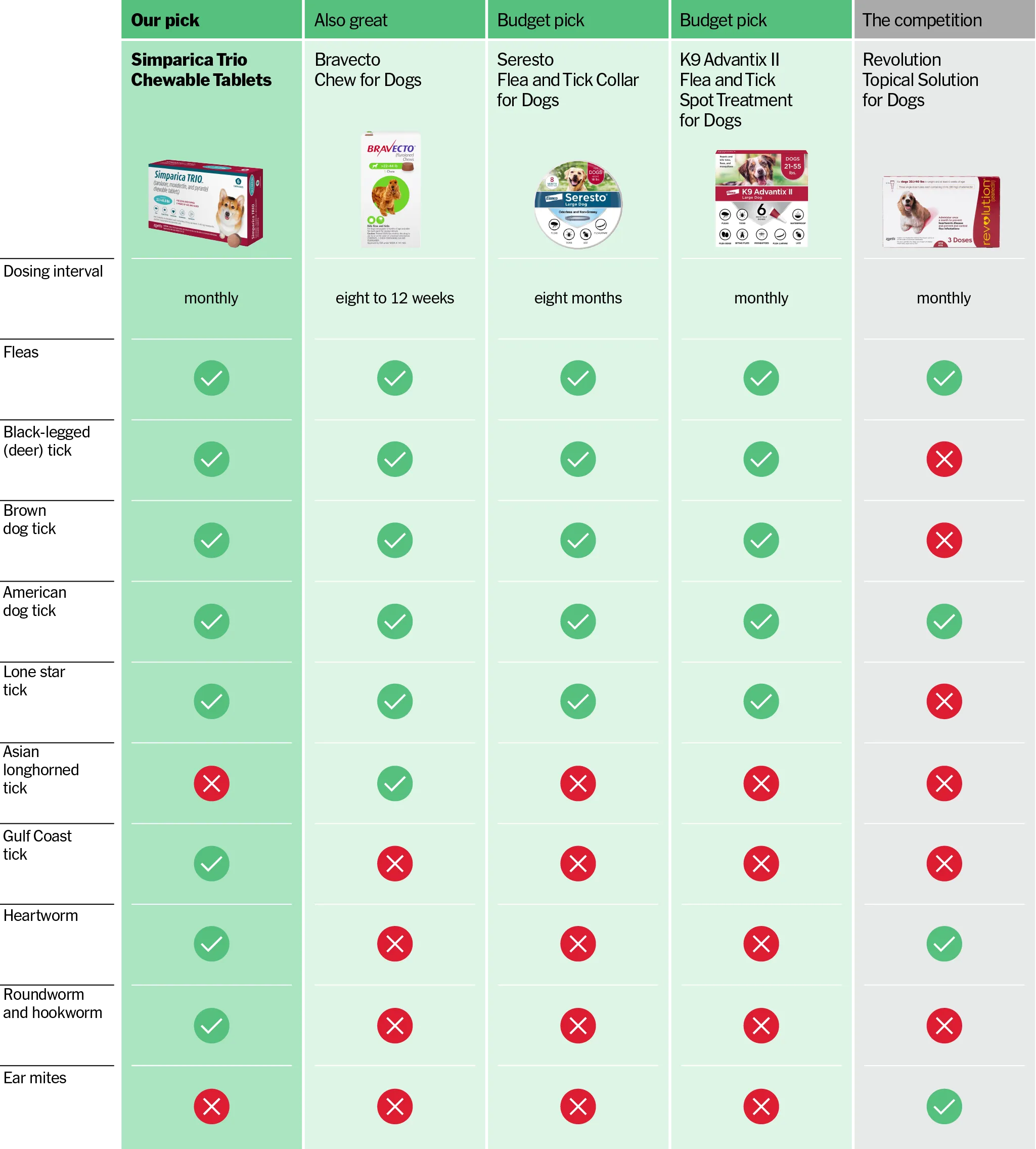 A chart comparing our treatment picks for dogs and the pests they help fight.
A chart comparing our treatment picks for dogs and the pests they help fight.
Budget is another practical consideration, as prices for treatments can vary significantly. Ease of administration – whether your dog prefers a chew, a topical application, or a collar – also impacts consistency and effectiveness. Ultimately, the best course of action is always to consult with your veterinarian. They can provide tailored advice based on your dog’s individual needs, health history, and local parasite risks, ensuring you choose the safest and most effective protection.
Conclusion
Protecting your dog from fleas, ticks, and other parasites is a continuous responsibility that directly impacts their health and well-being. While a range of effective over-the-counter options like the Seresto collar and K9 Advantix II topical treatment can provide excellent external parasite control and repellency, prescription medications such as Simparica Trio and Bravecto offer broader, more comprehensive protection, especially against internal parasites and heartworm. Understanding the differences between these treatments empowers you to make informed decisions. Always remember that a discussion with your veterinarian is invaluable; their expertise will guide you to the ideal preventative care plan, ensuring your canine companion stays healthy, happy, and parasite-free. Explore more articles on Dog Care Story to keep your pet thriving!
